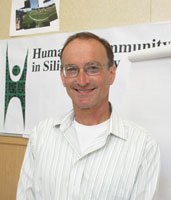The 2014 American Humanist Association Conference & A Discussion of our Group’s Future
July 6th 2014

Humanist Community in Silicon Valley (HCSV) members who attended the 73rd Annual Conference of the American Humanist Association in Philadelphia, Pa, from June 5 to June 8 will report their experiences, and reactions to the dynamic and expanding activities of the national Humanist organization of which HCSV is a proud chapter. The future of HCSV will also be a topic for this Forum. Please join us to offer your hopes and dreams for HCSV.

 Fears and suspicions about weapons of mass destruction have fueled tensions in the Middle East for decades, and a nuclear weapons free zone in the Middle East has been on the United Nations (UN) agenda since 1974. Last December, an unprecedented assembly of current and former members of the Israeli parliament and local and international peace and human rights activists met in Haifa, Israel, to call for a zone free of nuclear weapons and all other weapons of mass destruction in the Middle East and for a world free of nuclear weapons. Jackie Cabasso (Executive Director of the Western States Legal Foundation and a lifetime member of the Women’s International League for Peace and Freedom) attended the December 2013 Haifa conference and a May 2014 meeting on the Nuclear Nonproliferation Treaty at UN headquarters, and will discuss these efforts. (Co-sponsored by the Women’s International League for Peace and Freedom, Peninsula branch – contact person: Lois Salo, lsa1o@aol.com, 650-493-8872.)
Fears and suspicions about weapons of mass destruction have fueled tensions in the Middle East for decades, and a nuclear weapons free zone in the Middle East has been on the United Nations (UN) agenda since 1974. Last December, an unprecedented assembly of current and former members of the Israeli parliament and local and international peace and human rights activists met in Haifa, Israel, to call for a zone free of nuclear weapons and all other weapons of mass destruction in the Middle East and for a world free of nuclear weapons. Jackie Cabasso (Executive Director of the Western States Legal Foundation and a lifetime member of the Women’s International League for Peace and Freedom) attended the December 2013 Haifa conference and a May 2014 meeting on the Nuclear Nonproliferation Treaty at UN headquarters, and will discuss these efforts. (Co-sponsored by the Women’s International League for Peace and Freedom, Peninsula branch – contact person: Lois Salo, lsa1o@aol.com, 650-493-8872.)
